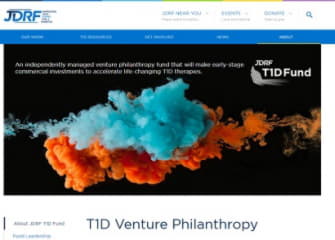
GluSense Ltd., a medical device company developing a long lasting injectable glucose sensor for treatment of Type 1 Diabetes (T1D), today announced it has received an investment from the JDRF T1D Fund, a venture philanthropy fund exclusively devoted to finding and funding the best early-stage T1D commercial programs.
Founded in 2007 and based in Rehovot, Israel, GluSense is part of the Rainbow Medical innovation house, a unique private business that seeds and grows companies developing breakthrough medical devices. GluSense’s GlydeTM CGM is a miniature long term injectable glucose sensor. It is injected under the skin and is expected to last for one year, providing continuous, accurate glucose measurements wirelessly to a convenient wearable device such as a watch. The injection of the device is minimally invasive and can be performed in a clinic using only local anesthesia. The T1D Fund’s investment will be used to bring the Glyde CGM closer to the first in-human clinical trial, a key step in the commercialization process.
“Today, diabetic patients need to endure frequent finger pricks daily in order to manage their glucose level, and even with modern CGMs, frequent calibrations, measurement verifications and replacements are still a hassle and limit efficient treatment,” said GluSense CEO Dr. Boaz Brill. “In contrast, our Glyde continuous glucose monitor (CGM) will provide accurate glucose measurement for a full year with significantly fewer blood glucose calibrations. This ground-breaking technology will simplify and improve the life of people living with T1D and insulin dependent T2D worldwide.”
“This collaboration is a significant recognition of the GluSense product and technology,” said Efi Cohen-Arazi, Chairman of GluSense and CEO of Rainbow Medical. “It will speed up our development process and ensure the technology meets the needs of patients and caregivers.”
“The GluSense Glyde CGM is a highly innovative and promising technology,” said Jonathan Behr, Managing Director of the T1D Fund. “When paired with future advanced artificial pancreas systems or insulin injections, it will reduce the burden of T1D and help those living with the disease maintain blood glucose levels in a safe range.”
GluSense’s technology uses a proprietary fluorescent glucose-sensitive biosensor that ensures accurate glucose measurement across the full physiological range, with enhanced accuracy at the medically-important hypo glucose range. Another GluSense breakthrough ensures that the biosensor level in the implant is maintained stable over the long term using engineered live cells that constantly replenish the biosensor in the implant. The stable biosensor level enables calibration frequency to be significantly reduced, freeing users from the daily hassle of multiple calibration finger pricks.
About GluSense Ltd.
GluSense was founded by Rainbow Medical, the premier Israeli Innovation and Investment House.
GluSense team includes top scientists and engineers dedicated to creating advanced technologies and breakthrough products that will improve the lives of people with diabetes worldwide. The company is funded by Rainbow Medical, several venture funds from US and China, Israel’s Innovation Authority and the JDRF T1D Fund. For more information, see http://www.glusensemedical.com/.
About Rainbow Medical Ltd.
Rainbow Medical (www.rainbowmd.com) is a unique private operational investment company that seeds and grows start-up companies developing breakthrough medical devices invented by Yossi Gross, in a diverse range of medical fields. By addressing significant unmet market needs, Rainbow Medical seeks to improve people’s lives and generate exceptional returns for its shareholders.
About The JDRF T1D Fund
The JDRF T1D Fund (www.t1dfund.org) is a venture philanthropy fund exclusively devoted to finding and funding the best early-stage T1D commercial opportunities to accelerate the delivery of treatments, preventions, and cures to patients. It was created to solve a critical funding gap in the T1D drug and device development pipeline. Through partnerships with private capital, including venture capital, pharma and foundations, the T1D Fund anticipates that it will be able to attract substantially more private investment to the T1D field than occurs today. The T1D Fund will initially focus on artificial pancreas systems, metabolic control, beta cell replacement, prevention, and beta cell restoration therapies, with an exclusive priority on the best commercial opportunities. The T1D Fund will reinvest any realized gains into new investments to further its mission.


